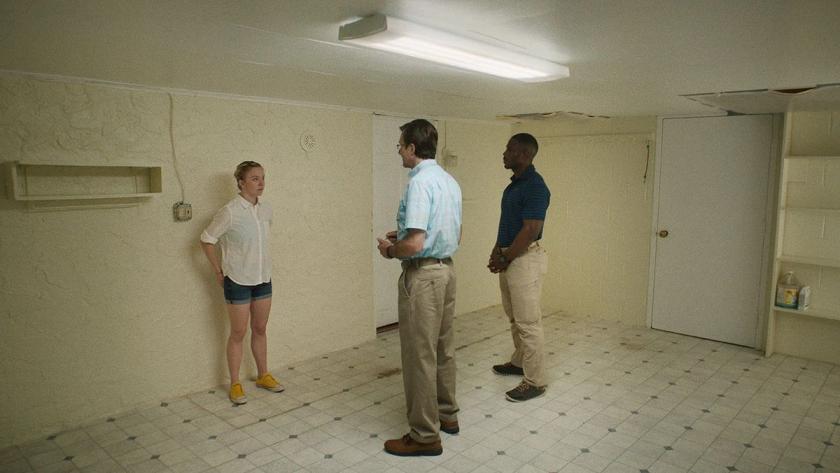The actress Sydney Sweeney’s face in the harrowing docudrama Reality is an ever-evolving map, its contours and pallor altering as it gradually dawns on her character, the real-life American whistleblower Reality Winner, that her conscience has put paid to her freedom for the forseeable future.
Sweeney’s eyes are big to begin with but they seem to expand as Winner agonizingly bleeds out the truth of the unauthorised action she took to protect democracy during Donald Trump’s presidency; the eyes of Wallace Taylor (Marchánt Davis), one of the two FBI agents grilling Winner, never blink, his stare a drill bit boring into her flesh. Late on, Sweeney/Winner (pictured below) flushes crayon pink with misery as she breaks the fourth wall.
The Texan former US Air Force linguist Winner, 25, fluent in Farsi, Dari, and Pashto, a woman who lived alone with her cat and dog, was ambushed at her home in suburban Augusta, Georgia, by an all-male team of FBI agents armed with search warrants on 3 June 2017. They never read her the Miranda Warning, advising of her right to remain silent, and her nervous answers to their questions incriminated her. Though these men, some of them burly, never touch Winner in Tina Satter’s film – a female agent eventually arrives to cuff her – there is an implicit gendered threat in their interaction with her.
While working as a translator for the military contractor Pluribus, Winner had anonymously mailed to The Intercept investigative news website a National Security Agency intelligence report on Russian interference in the 2016 Presidential election; the site, co-founded by CitizenFour director Laura Poitras, failed to keep Winner’s name from the media. Having sacrificed her ambition of working overseas with Army Special Forces, Winner was sentenced on 23 August 2018 to five years and three months in prison for violating the Espionage Act of 1917, the longest term imposed in federal court for leaking a classified government document.
Trump called her offence “small potatoes” but ignored her request for her sentence to be commuted. Arguing she should be freed, The Washington Post columnist Margaret Sullivan said Winner was the FBI’s “head on a pike for Trump.” Winner was released for good behavior to home confinement with an ankle bracelet on 2 June 2021. On probation to November 2024 and now working as a CrossFit (high-intensity interval training coach), she hasn’t been pardoned.
 Like Satter’s 2019 play Is This a Room, Reality – which she co-wrote with James Paul Dallas – was adapted from the transcript of Taylor and fellow FBI agent Justin Garrick’s questioning of Winner, mostly in the empty back bedroom of her modest bungalow, a space rendered forbidding by its stark white walls and the way cinematographer Paul Yee manipulates it to show the Feds hemming in their prey.
Like Satter’s 2019 play Is This a Room, Reality – which she co-wrote with James Paul Dallas – was adapted from the transcript of Taylor and fellow FBI agent Justin Garrick’s questioning of Winner, mostly in the empty back bedroom of her modest bungalow, a space rendered forbidding by its stark white walls and the way cinematographer Paul Yee manipulates it to show the Feds hemming in their prey.
This isn’t a “we have ways of making you talk” scenario. Unfailingly courteous, the preppy, bespectacled Garrick (Josh Hamilton, deceptively bland) leads the interrogation with small talk, much of it about Winner’s pets, as might a mild-mannered grade-school teacher warming up to a condemnation of a student’s delinquency at a PTA meeting. He peppers his platitudes with mock-embarrassed admissions of his physical frailties, allowing Winner to think she’s tougher than him. Lured into a false state of security, she’s disarmed when he demands answers in a newly steel-plated voice.
The muscular Taylor is less affable and jumpier – after Winner gives her cellphone to him, he jabs his hands at her to stop her touching it. Their colleagues mill around Winner’s rooms, raking through and photographing her belongings. Not knowing what the spooks already know about her, Winner suddenly finds herself cornered.
Reality was sparely filmed on two sets with fleeting location work in 16 days, the “other” set showing Winner in her Pluribus cubicle on 9 May 2017, the TV behind her tuned to Fox News as it reports Trump’s firing of James Comey, the director of the FBI, for leading a criminal investigation into whether the President’s advisers colluded with the Russian government in tampering with the election. The film frames this event as the catalyst for Winner’s decision to blow the whistle.
Satter interpolates the interrogation with shots of the emergent typescript. When the live action coincides with exchanges that were subsequently redacted, the characters are fizzed from the images, as if removed by a conjuror – a stylistic sleight that comments on the inherent dishonesty in censorship. It works, but the appearance on a window sill of a garden snail, noticed by Winner as it's about to topple under the weight of its shell, adds unnecessary symbolism, whether or not the real Winner saw one. As for the elephant in the room, he remains at large.















Add comment